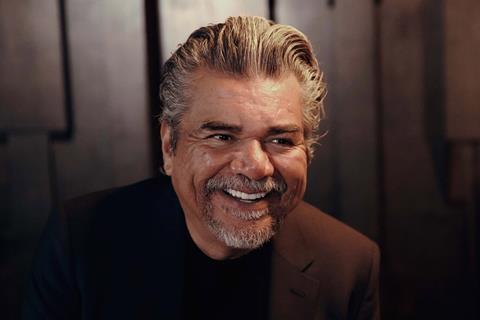Director Eva Longoria Baston pulls no punches in her portrait of rival boxers Julio Cesar Chavel and Oscar De La Hoya

Dir: Eva Longoria Baston. UK. 2021. 104mins
When boxers Julio Cesar Chavez and Oscar De La Hoya met in the ring on June 7, 1996, it wasn’t just a battle between two exceptional fighters but also a showdown between duelling visions of Mexican cultural identity. Director Eva Longoria Baston engagingly recounts this epic bout, speaking to the pugilists, as well as family members, trainers and journalists, to create a sense of why the fight resonated so deeply within the Mexican and Mexican-American communities. Similar to the highlights-plus-historical-context treatment ESPN brings to its entertaining ’30 For 30’ sports documentaries, La Guerra Civil is breezy but thoughtful, arguing that the fight may have taken place more than 25 years ago, but the larger societal issues remain.
La Guerra Civil is especially strong when connecting the 1996 face-off with larger cultural trends
This Sundance premiere, slated to stream on the DAZN sports platform in the US, features extensive, separate interviews with Chavez and De La Hoya, proud former fighters reflecting on their lives with candour and humour. La Guerra Civil also offers a wealth of archival clips — not just from the 1996 fight but also earlier bouts in the two men’s careers — and moves at a steady pace, building to the main event and its aftermath.
The documentary traces both boxers’ early days, depicting Chavez as a young man who grew up in poverty in Mexico, finding success in the ring. De La Hoya (about 10 years younger than Chavez) was a first-generation American raised by Mexican parents who moved to Los Angeles; his nickname ’The Golden Boy’ was inspired by his movie-star looks. To outsiders, including many boxing promoters, Chavez and De La Hoya were both Mexican, but La Guerra Civil explains why a large percentage of Latin American sports fans disagreed. Chavez was viewed as authentically Mexican, while De La Hoya, because of his US upbringing, was derided as a “pocho” — someone who has abandoned his Mexican heritage.
Longoria Baston explores these perceptions in detail, letting them serve as her film’s thematic through-line. Even now, De La Hoya, who espouses great love for his family’s Mexican roots, seems stung by the criticism that he wasn’t “Mexican enough.” Interestingly, La Guerra Civil illustrates how he became a household name in the States because of his ability to connect with American boxing fans — especially women, who were as interested in him physically as they were in the sport. The film investigates certain cultural stereotypes around Latino masculinity: De La Hoya is mocked in some quarters for being a “pretty boy,” while Chavez’s pitbull-like intensity in the ring earned him kudos for his rugged machoism. As a result, it’s little wonder that the younger fighter was hungry to prove how tough he was.
La Guerra Civil is especially strong when connecting the 1996 face-off with larger cultural trends; specifically, the rise in Mexican immigration to America, changing the country’s demographics in the process. De La Hoya’s ascension was the epitome of the American dream, but provoked a backlash from some Latinos who resented his ease at assimilating. Celebrities like George Lopez and Mario Lopez help personalise this internal tug-of-war that Mexican-Americans feel between their roots and their present, and La Guerra Civil shows great compassion for these tricky questions of national identity.
For those simply wanting to relive the boxers’ most glorious moments, the documentary contains memorable insights regarding Chavez’s and De La Hoya’s contrasting sparring styles. As with the ’30 For 30’ series, La Guerra Civil can be formulaic in its narrative, segueing dutifully from one important fight to the next, inevitably concluding with their 1996 bout. But because we know these two men so well by that point — and understand the larger societal issues at play — we’re emotionally invested in the outcome.
That pivotal fight proves a worthy capper, with both boxers offering their perspective round by round. For the ageing Chavez, this much-hyped event arrived as his skills were in decline, while De La Hoya recalls realising that he was about to square off against his childhood hero. For anyone unaware of the outcome, it would be unsporting to reveal what happens, but Longoria Baston does dig into a controversy that sprung up after the fight and also chronicles the rematch that occurred two years later. Decades may have passed, but it appears that Chavez and De La Hoya still harbour some resentment toward one another; a byproduct of the rivalry that made their showdowns must-see television — and gives La Guerra Civil its punch.
Production company: UnbeliEVAble Entertainment
International sales: DAZN, Kevin.Joseph@dazn.com
Producers: Eva Longoria Baston, Grant Best, Bernardo Ruiz, Ben Spector, Andrea Cordoba
Editing: Luis Alvarez y Alvarez
Cinematography: Claudio Rocha
Music: Tony Morales
























